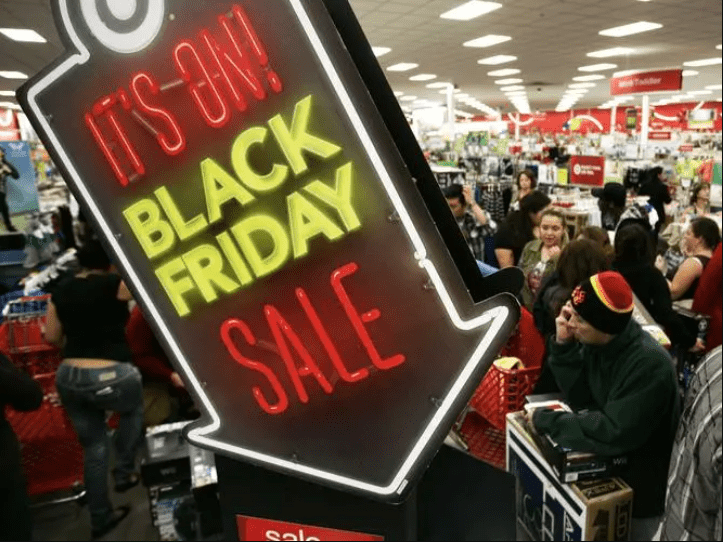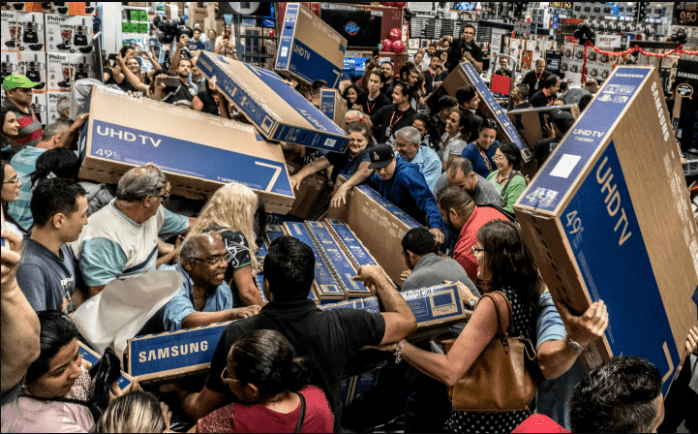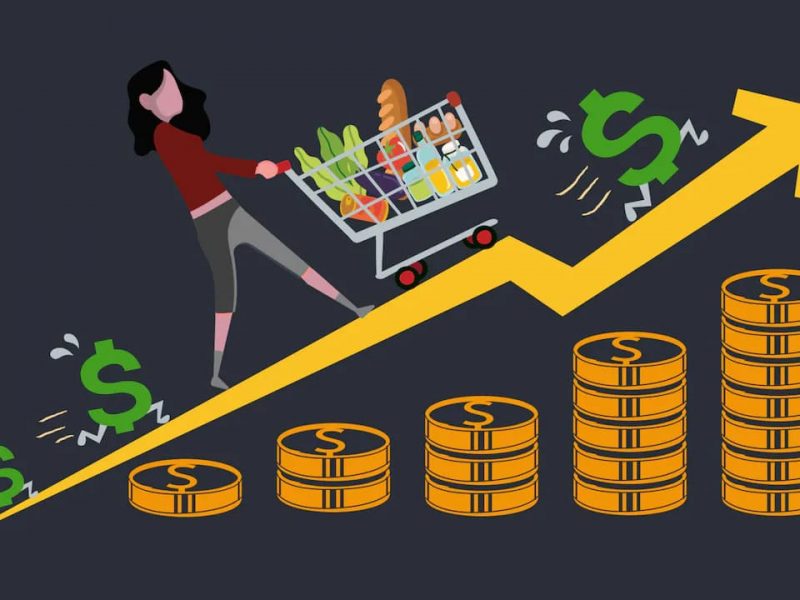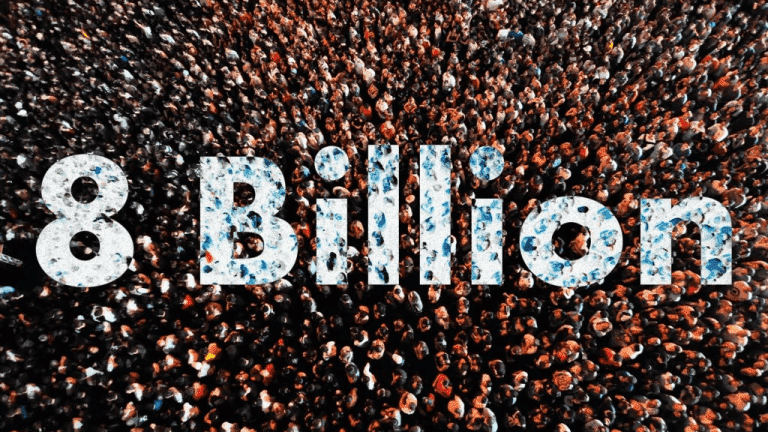Shopping Frenzy of Black Friday and Cyber Monday
On November 28 local time, the United States ushered in the first Monday after Thanksgiving, known as “Cyber Monday”. According to the latest report from Reuters, data from Adobe Analytics shows that on “Cyber Monday” this year, online spending by American consumers reached $11.3 billion, far higher than the $9.12 billion of “Black Friday”, making it the largest online shopping festival in the United States.

Black Friday will usher in a trough?
“Black Friday” marks the start of the month-long holiday shopping season in the United States. On this day, major merchants in the United States concentrated on discounts and promotions to attract consumers to buy cheap and favorite products. November 25 is this year’s “Black Friday”.
However, unlike the previous scenes of wild consumption by Americans, there are very few consumers in front of stores with slightly lower discounts. U.S. consumers are increasingly budget-conscious, partly because of shrinking wages, rising debt, and partly because of price pressures from high inflation. Against this backdrop, total U.S. household debt surged by $351 billion in the third quarter of this year, the largest increase since 2007.
According to the survey data released by the University of Michigan a few days ago, the US consumer confidence index in November fell by 5.2% month-on-month and 15.7% year-on-year.
According to a recent NBC survey, 67% of respondents said inflation was making it difficult to buy something they wanted, while 69% feared the recession would limit their spending power. The survey also showed that the negative impact of inflation was more pronounced for those on low incomes.
Among U.S. consumers, young people with short working years and low wealth accumulation are particularly hard-pressed. According to the NBC survey, 73% of 18- to 34-year-olds worry that inflation will prevent them from buying the things they want. Jay Schottenstein, CEO of American Eagle, a fashion clothing brand mainly targeting young consumers, also said that inflation has a more significant impact on young people, and the company has to use greater promotional efforts than before to attract consumers.
Consumers are having a hard time, and businesses are feeling the pressure. Judging from the data, many institutions predict that this year’s holiday shopping season sales will increase slightly year-on-year. But if inflation is taken into account, the actual sales may not be as good as last year’s level. Walmart, Target, Amazon and other retailers have said higher food and gas prices are straining household budgets, resulting in fewer sales of toys, furniture and small appliances than in the past. Many retailers lowered their sales forecasts for this year’s holiday shopping season.
“Cyber Monday” sales are poised to break records!

As one of the shopping festivals, this year’s “Cyber Monday” in the United States is quite crazy. According to the latest report released by Adobe Analytics, American consumers may spend $11.6 billion in the entire “Cyber Week” this year, as various discount promotions emerge in an endless stream, even though many consumers are still under the pressure of high inflation, they can’t stop placing an order.
First of all, we need to clarify a concept that Cyber Monday refers to the first Monday after “Black Friday”, which is one of the most popular shopping days in the United States of the year. On this day, many merchants will offer considerable discounts in their online stores to attract customers. The saying originated in 2005 and was initiated by the Shop website under the National Retail Federation, because American merchants found that more and more consumers chose to shop online on the Monday after Thanksgiving.
This year, American consumers spent more money than expected on Black Friday and Thanksgiving. Online shopping on Black Friday reached $9.12 billion, an increase of 2.3% compared to the same period last year; online shopping on Thanksgiving reached $5.29 billion, an increase of 2.9% year-on-year. Last year’s “Cyber Week” US consumers spent a total of $10.7 billion, and this year’s “Cyber Week” consumption amount is expected to break the record. Although the current inflation in the United States continues to increase, many consumers have changed their previous consumption habits. However, throughout November, various discount promotions emerged one after another, attracting many consumers to place orders. According to statistics, from November 1st to November 27th, the online shopping consumption of American consumers reached 96.42 billion US dollars, a year-on-year increase of 2.1%, and the average daily online shopping expenditure exceeded 2 billion US dollars.
It is worth mentioning that many types of products are selling very well on Cyber Monday. Top-selling toys include Hot Wheels, Cocomelon, Bluey, Disney Encanto, LOL Surprise dolls, Roblox, and Fortnite. Top-selling game consoles include Nintendo Switch, Series X, and PlayStation 5. At the same time, related game products are also very popular, including FIFA 23, God of War Ragnarok, Call of Duty: Modern Warfare II, Madden 23 and NBA 2k23. Other top sellers include Apple iPads, Apple MacBooks, digital cameras, Roku devices, drones, gift cards, and Instapots.
Compared with the sales in October, the sales of many categories of products in the US online market during this year’s Cyber Monday ushered in a rapid growth. Among them, sales of toys increased by 383%, sales of sporting goods increased by 239%, sales of jewelry increased by 230%, and sales of clothing increased by 217%.
From the above data, it is not difficult to find that the United States has ushered in one after another discount festivals, Black Friday and Cyber Monday, but high inflation casts a shadow on the shopping season, sales data is not satisfactory, and the overall performance is not as expected. In the case of reduced disposable income, on the one hand, high inflation has brought higher price pressures, and on the other hand, economic recession expectations have intensified. Consumers are more inclined to pay attention to low-priced commodities or daily necessities with large discounts. Consumer confidence and purchasing power has declined substantially.
While there were concerns that inflation might dampen consumer momentum, the shopping frenzy on Black Friday and Cyber Monday saw sales hit record highs on both days.


